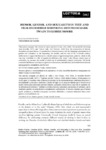Mostrar o rexistro simple do ítem
Humor, Gender, and Sex(uality) in Text and Film: Incredible Shrinking Men from Mark Twain to Lorrie Moore
| dc.contributor.author | Núñez-Puente, Carolina | |
| dc.date.accessioned | 2020-11-26T08:37:48Z | |
| dc.date.available | 2020-11-26T08:37:48Z | |
| dc.date.issued | 2020 | |
| dc.identifier.citation | Núñez Puente, Carolina (2020), “Humor, Gender, and Sex(uality) in Text and Film: Incredible Shrinking Men from Mark Twain to Lorrie Moore”, Lectora, 26: 133-150. ISSN: 1136-5781 D.O.I.: 10.1344/Lectora2020.26.9 | es_ES |
| dc.identifier.issn | 1136-5781 | |
| dc.identifier.uri | http://hdl.handle.net/2183/26789 | |
| dc.description.abstract | [Abstract] This article compares The Diaries of Adam and Eve (Twain, 1904-1906), The Incredible Shrinking Man (Arnold, 1957), and “You’re Ugly, Too” (Moore, 2008) from the perspectives of humor, feminism, and queer theory. It examines how humor interacts with the changing representations of gender and sex(uality) at the beginning, the middle, and the end of the twentieth century; furthermore, it argues that humor is a valuable means of questioning binary patterns, which in this way may contribute to a life of equality-in-difference (my term). I also discuss certain types of comicality, e.g. sarcasm, the results of which can be detrimental or simply conformist. The article concludes that humor can help us to pull down hierarchies, find affinities, and build ethical relations among genders, sex(ualiti)es, and beyond. | es_ES |
| dc.description.abstract | [Resumen] Este artículo compara Los diarios de Adán y Eva (Twain, 1904–1906), El increíble hombre menguante (Arnold, 1957) y “También eres feo” (Moore, 2008) desde el humor, el feminismo y la teoría queer. Se examina cómo el humor interactúa con las representaciones cambiantes de género y sexo(ualidad) a principios, mediados y finales del siglo xx; se propone además que el humor es un medio valioso para cuestionar patrones binarios, pudiendo conducirnos a una vida de igualdad-enla- diferencia (mi término). También se evalúan tipos de comicidad, por ejemplo, el sarcasmo, cuyos resultados pueden ser perjudiciales o simplemente conformistas. El artículo concluye que el humor puede ayudarnos a derribar jerarquías, encontrar afinidades y construir relaciones éticas entre géneros, sexo(ualidade)s, etc. | es_ES |
| dc.language.iso | eng | es_ES |
| dc.publisher | Universitat de Barcelona | es_ES |
| dc.relation.uri | https://doi.org/10.1344/Lectora2020.26.9 | es_ES |
| dc.rights | Atribución-NoComercial-SinDerivadas 3.0 España | es_ES |
| dc.rights.uri | http://creativecommons.org/licenses/by-nc-nd/3.0/es/ | * |
| dc.subject | Humor | es_ES |
| dc.subject | Gender | es_ES |
| dc.subject | Twain, Mark | es_ES |
| dc.subject | Moore, Lorrie | es_ES |
| dc.title | Humor, Gender, and Sex(uality) in Text and Film: Incredible Shrinking Men from Mark Twain to Lorrie Moore | es_ES |
| dc.title.alternative | Humor, género y sexo(ualidad) en la narrativa y el cine: increíbles hombres menguantes de Mark Twain a Lorrie Moore | es_ES |
| dc.type | info:eu-repo/semantics/article | es_ES |
| dc.rights.access | info:eu-repo/semantics/openAccess | es_ES |
| UDC.journalTitle | Lectora: revista de dones i textualitat | es_ES |
| UDC.volume | 26 | es_ES |
| UDC.startPage | 133 | es_ES |
| UDC.endPage | 150 | es_ES |
Ficheiros no ítem
Este ítem aparece na(s) seguinte(s) colección(s)
-
GI-CLEU - Artigos [14]






